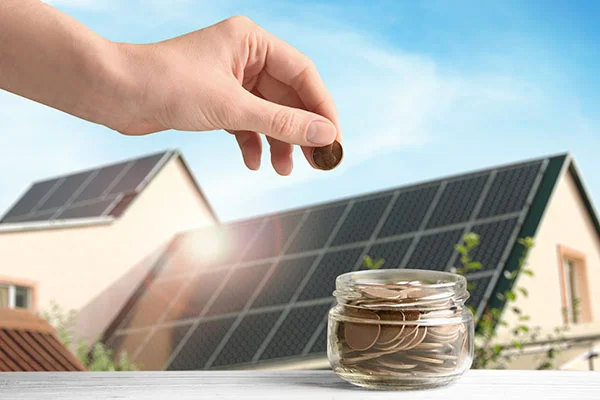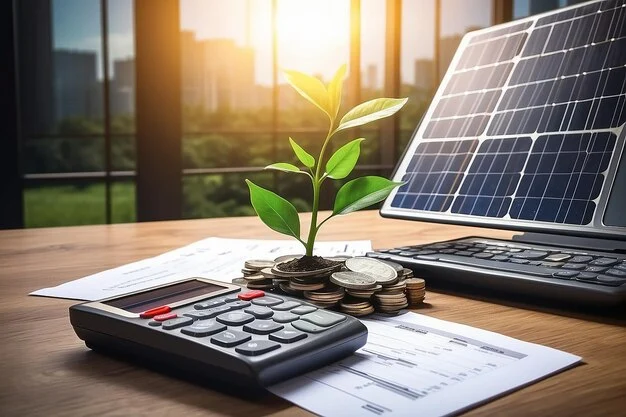In recent years, the rise of solar power has become one of the most impactful trends in energy. As global awareness of environmental issues grows, many businesses and homeowners are exploring the benefits of solar energy. One of the most compelling advantages is the potential for substantial cost saving with solar energy. This guide will delve into how solar power can lead to significant financial benefits, including reduced electricity bills, increased property value, and long-term investment returns.
Understanding the Basics of Solar Power

Solar power harnesses energy from the sun using photovoltaic (PV) panels, which convert sunlight into electricity. By installing a solar power system, individuals and businesses can generate their own electricity, reducing reliance on traditional energy sources. This shift not only contributes to environmental sustainability but also offers considerable cost saving with solar energy.
Initial Costs vs. Long-Term Savings
1. Installation Costs
The initial cost of installing solar panels can be high, but the long-term savings can make it a worthwhile investment. The payback period, or how long it takes to recoup the initial investment, can vary from 3-5 years.
2. Financial Incentives and Rebates
While the upfront cost of solar panels can be high, the long-term financial benefits and environmental advantages can outweigh the initial investment. Solar panels can pay for themselves over time through energy savings, tax credits, and increased property value. Government incentives and utility rebates can also help offset the initial cost.
Reducing Electricity Bills
Solar energy can reduce electricity bills by generating your own power and reducing your reliance on the grid. Here are some ways solar energy can help reduce your electricity bill
1. Solar panels
Solar panels can reduce electricity bills by up to 100% or more per month. for India, a 1 kW solar system can generate 100–180 units of electricity per month, which can power household essentials. Solar panels can also provide a steady source of renewable energy, which can increase the value of your rental property.
2. Net Metering and Feed-In Tariffs
In many regions, net metering allows solar power system owners to receive credits for excess electricity generated and fed back into the grid. This can further enhance cost saving with solar energy. Feed-in tariffs, where available, provide fixed payments for electricity produced by solar systems, offering an additional income stream.
Increasing Property Value
1. Impact on Home Value
Solar panels can increase the value of your home, and the impact can vary depending on location, energy rates, and other factors. According to a Zillow study, solar panels can increase a home’s appraisal value by 4.1% on average, but some homes may see an increase of up to 20%. Solar panels can also help homes sell faster, potentially up to 20% faster than homes without solar power.
2. Commercial Property Benefits
For commercial properties, solar power can enhance asset value and appeal to potential buyers or tenants. Businesses with solar installations can leverage their commitment to sustainability as a competitive advantage, attracting environmentally conscious customers and partners. This also contributes to long-term cost saving with solar energy.
Long-Term Financial Returns
Solar panels can be a long-term investment with stable returns and a payback period of 3–5 years. Solar systems can last over 25 years with proper maintenance and can help reduce electricity costs. Once the initial cost is recovered, the energy generated by solar panels is essentially free for 18–22 years.
1. Return on Investment (ROI)
According to Forbes, a good ROI for solar panels is 6–8%, which is lower than the national average of 10%. However, some say that solar investments can offer returns of 10–12% IRR over the long term.
2. Energy Independence and Stability
Solar power reduces reliance on external grids, providing stability during power outages and protection against rising energy prices.
Maintenance and Reliability
1. Low Maintenance Costs
Solar power systems require minimal maintenance. Regular cleaning and occasional inspections are generally sufficient to keep the system operating efficiently. Most solar panels come with warranties of 25 years, ensuring long-term reliability and performance. This low maintenance further enhances cost saving with solar energy.
2. Durability and Longevity
Solar panels are designed to withstand harsh weather conditions and have a long lifespan. The durability of solar panels ensures that they continue to provide cost savings over many years, further improving the overall cost saving with solar energy.
Future Trends in Solar Power and Cost Savings
1. Technological Advancements
Ongoing advancements in solar technology are expected to further reduce costs and improve efficiency. Innovations such as more efficient solar panels and energy storage solutions will enhance the financial benefits of solar power, boosting cost saving with solar energy.
2. Market Trends
As the adoption of solar power grows, economies of scale will drive down the cost of solar installations. This trend will make solar power increasingly accessible and affordable for both residential and commercial users, amplifying cost saving with solar energy.
Conclusion
Solar power presents a compelling opportunity for significant cost saving with solar energy. By investing in solar energy, individuals and businesses can reduce their electricity bills, increase property value, and enjoy long-term financial returns. With the added benefits of financial incentives, low maintenance costs, and advancements in technology, solar power is a smart investment for those looking to save money and contribute to a sustainable future.For more information on how solar power can benefit you and maximize cost saving with solar energy, contact a local solar provider and explore the available options and incentives.
